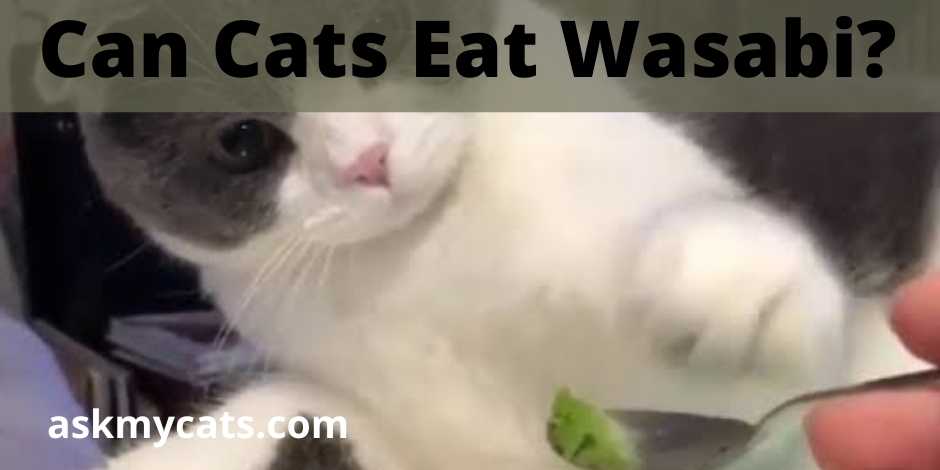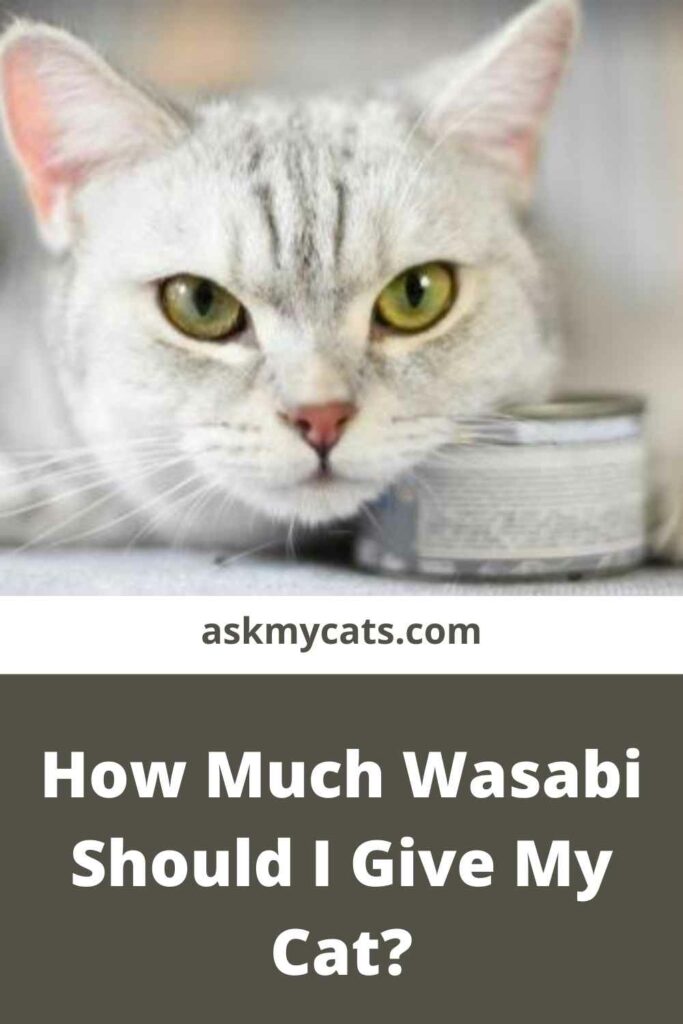Sushi is incomplete without wasabi, which is typically served as a garnish. True wasabi is a Brassicaceae family plant that is linked to mustard and horseradish. The majority of commercial wasabi is prepared with horseradish and mustard and is green in color.
To answer your question, yes, cats can eat wasabi. However, it should not be used in place of their regular cat food. And, at most, it should only be consumed as a once-in-a-while indulgence.
Wasabi does not provide sufficient nutritional value for a cat. It is also linked to horseradish, which is known to be mildly harmful to cats.
If you want to know more about the effects of wasabi on your feline friend, keep reading!


Give Your Cat the Perfect Day
Get the Free Ebook!
Do Cats Like Wasabi?
Generally, cats dislike the taste of wasabi. It’s unlikely that your cat would be fascinated in wasabi after one taste, so there’s no harm in letting them try it.
Cats are notoriously nosy, particularly when you’re eating. If you like sushi, you may discover that your cat is curious about the wasabi.
Wasabi is a controversial component when it comes to whether it is healthy or not for your cat, but if your cat eats a tiny quantity, it is unlikely to damage him.
What Happens When Cats Eat Wasabi?
Cats aren’t designed to eat plants, but they could be curious enough to sample your wasabi. Most cats, on the other hand, are unlikely to want to eat it again.
Cats, in most cases, not only ignore but also actively avoid wasabi. Isothiocyanate is found in both fake and authentic wasabi. This chemical component is what makes wasabi hot, but it’s also a repellent for cats, and it’s thought to be rather effective.
Wasabi is beneficial to humans, notably in terms of cancer prevention and the capacity to combat germs such as e.coli, but cats dislike it.
Can Cats Taste Wasabi?
There’s no reason your cat shouldn’t have a taste of wasabi. It is unlikely to damage your cat, but you should keep the quantity they consume to a minimum.
Cats, in most circumstances, do not enjoy the flavor of wasabi and will refuse to eat it after only one bite.
Give your cat a taste if they appear to be interested. They’ll probably make a hilarious cat expression and flee as quickly as they can in the opposite way.
Can Wasabi Hurt Or Kill A Cat?

Wasabi is quite unlikely to kill cats. Because of the chemical components present in it, most cats will not consume enough of it to cause harm.
Furthermore, cats do not appreciate the flavor, and after just one nibble, they tend to make a face and walk away, or even puke it up.
The primary issue is that most commercial wasabi has a lot of mustard and horseradish, which is why it’s so popular. These aren’t harmful to cats, but they’ll almost certainly make your cat vomit if they consume any of them. It can also make them feel a little nauseous.
If your cat has a sensitive stomach, you’ll definitely have to clean up cat wastes for a while after her consumption, but any harm will likely be minimal.
If you give your cat wasabi, make sure the commercial, fake wasabi doesn’t contain any components that might make your cat sick, such as garlic or onion. It shouldn’t include any of these ingredients, but it’s always a good idea to double-check your ingredient lists before allowing your cat to sample anything from your dish.
In any case, cats are unlikely to feel the urge to consume wasabi, so worrying about a cat overdoing it is probably not worth the effort.
Wasabi, on the other hand, should not be consumed by kittens. Their stomachs are too little and delicate, and they require as much nutritious nourishment as possible to keep up with their rapid growth.
Because wasabi may make a cat feel unwell, it’s better to keep them away from your sushi and any toppings. If you have a very inquisitive young cat, simply eat your meal away from them until they lose interest in pursuing your dish.
How Much Wasabi Should I Give My Cat?

If your cat is interested in trying it, the amount should be very small, not even a pea-sized amount. Most cats will lick it for a few seconds before walking away with a disgusted grimace on their face, or they will smell it and then walk away.
You’ll probably be able to detect if your cat has had too much wasabi pretty soon. You may notice a lot of sneezing, a lot of water, vomiting, diarrhea, stomach discomfort, and pain, as well as scratching its face to attempt to get rid of the taste and smell.
Remember that compared to people or dogs, “a lot” isn’t much at all for cats, so even a tiny taste may be enough to turn your feline companion off.
If you have the exceedingly uncommon cat who likes wasabi and isn’t disturbed by it, it should be a very rare and very little reward, as the tip of your fingernail size treat.
Wasabi has no nutritional value for cats, and they can’t digest it correctly, to begin with.
Therefore, we recommend that you keep your cat’s wasabi-eating habit only to a minimum.
Can Cats Eat Horseradish?
Horseradish is a member of the Brassica family and is related to turnips (Brassica Rapa). As a result, their leaves and roots generate glucosinolates, which are the enzymes that give the roots their spicy flavor. These enzymes can be harmful in high doses, although horseradish is generally safe to ingest.
Avoid giving your cat horseradish to consume. We strongly advise that if you believe your cat has consumed any part of the horseradish plant, you should seek urgent expert veterinarian assistance.
Can Cats Eat Wasabi Peas?
Green peas that have been covered and roasted in wasabi are known as wasabi peas. Peas are not advised for cats in general since they might cause renal and digestive issues. Spicy foods, such as wasabi peas, have also been reported to cause throat constriction in cats, making breathing difficult for the feline.
While eating one wasabi pea by mistake would not affect your cat’s health, keep them away from them to avoid getting them sick.
Are There Food Alternatives For Wasabi?

Cats are obligate carnivores, therefore cooked meats like chicken or beef, as well as specially prepared cat food, preferably wet cat food, are perfect for keeping your cat hydrated.
Cats do not prioritize vegetables. However, they are safe to eat.
Here are some alternative foods you can give your feline friend instead of wasabi:
1. Avocado
Although avocado is not suitable for all tiny animals, it is suitable for cats. Make sure the avocado’s outer shell and pit are removed. The avocado should not be a problem for your cat.
2. Seaweed
Seaweed is also edible to cats. We recommend feeding it in tiny amounts Your cat should be able to digest it just fine and have no problems with it.
3. Cucumber
Cucumber is another option that your cat could prefer over wasabi. Cucumber has a number of advantages that your cat will enjoy. Vitamins, minerals, and water content are all abundant in this vegetable.
Frequently Asked Questions
Can You Give Wasabi To Cats?
Wasabi may be eaten by cats, however, it should be used as a rare treat. It does not provide sufficient nutritional value for a cat.
Can Cats Eat Seaweed?
Seaweed is simpler to digest for pets, and it may help firm their stool, regulate their digestion, and boost their metabolism. Consult your veterinarian about adding seaweed to your pet’s food if she suffers from stomach sensitivity
Are Bananas Bad For Cats?
Bananas are a safe and nutritious treat for your cat, but only in little amounts. Simply cut a little slice of your banana and feed it to her.
Final Words
Wasabi may be a favorite plant among people, but it is unlikely to be so for cats. Wasabi does have some great health advantages, such as cancer-fighting properties, antioxidants, and the potential to treat people with food illness, but it’s not much help for cats.
Commercial wasabi is far too hot to be attractive, and real wasabi is more likely to repel than entice your cat. Cats, after all, are obligate carnivores, and they don’t need to consume vegetables (or vegetable paste) to be healthy. Keep your wasabi to yourself and give your cat snacks that are more acceptable.
If you have any more queries regarding your feline friend’s eating habits, drop them in the comment section below.
Also, check out Can Cats Eat Mustard? Is Mustard Bad For Cats?
